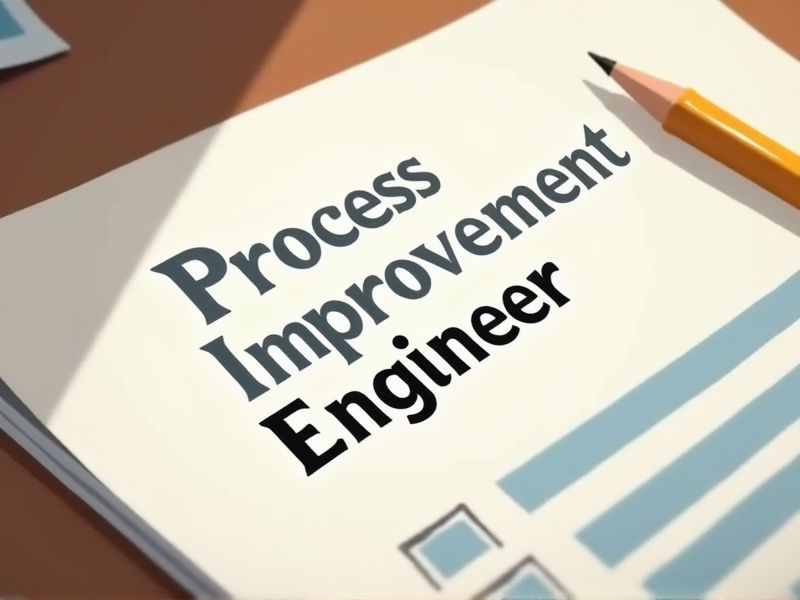
The role of a Process Improvement Engineer demands a keen understanding of systems optimization and efficiency enhancement. Certifications equip these professionals with standardized knowledge and validated skills essential to drive impactful changes. They bridge the gap between theoretical understanding and practical application, ensuring the ability to implement best practices effectively. Here are some key certifications that can enhance your expertise as a Process Improvement Engineer.
Six Sigma Green Belt Certification
Earning a Six Sigma Green Belt Certification equips a Process Improvement Engineer with a structured methodology for eliminating defects, thus enhancing process efficiency. This certification validates the engineer's capability to use data-driven approaches in streamlining operations and optimizing resources. It also enhances problem-solving skills, enabling engineers to improve product quality and customer satisfaction. Many organizations recognize this certification, resulting in better career opportunities and increased professional credibility for individuals in this role.
Six Sigma Black Belt Certification
Six Sigma Black Belt Certification provides a thorough understanding of process improvement techniques, enabling engineers to identify and eliminate inefficiencies. This credential equips professionals with the knowledge to apply data-driven methodologies for enhancing process performance. It also enhances an engineer's ability to lead cross-functional teams in implementing effective solutions. Having this certification increases job prospects and credibility within the field of quality management.
Lean Six Sigma Certification
Lean Six Sigma Certification equips a Process Improvement Engineer with data-driven methodologies to identify inefficiencies and reduce process variation. By mastering these skills, the engineer can enhance the quality and consistency of outputs, leading to improved customer satisfaction. The certification also imparts critical problem-solving techniques that enable engineers to implement sustainable improvements. As organizations increasingly prioritize efficiency and quality, having a Lean Six Sigma Certification becomes a valuable asset for career advancement and industry recognition.
Certified Quality Engineer (CQE)
A Process Improvement Engineer often requires a Certified Quality Engineer (CQE) to ensure that quality management principles are effectively integrated into process enhancement initiatives. CQE provides the technical expertise necessary to identify and rectify defects, leading to improved process reliability. The certification equips the engineer with advanced problem-solving skills, reducing waste and minimizing costs. Employing a CQE-backed engineer aids in maintaining compliance with industry regulations, fostering trust in both product and process quality among stakeholders.
Certified Manager of Quality/Organizational Excellence (CMQ/OE)
The CMQ/OE certification provides a Process Improvement Engineer with advanced skills in quality management principles, which enhances the ability to implement effective process improvements. This certification equips engineers with leadership competencies necessary for driving organizational excellence, fostering teamwork and influencing change. A deep understanding of quality systems and auditing gained through CMQ/OE enables engineers to identify and eliminate inefficiencies accurately. Having the CMQ/OE credential signals proficiency to stakeholders, increasing trust and viability in executing process improvement initiatives.
Project Management Professional (PMP)
Process Improvement Engineers often deal with complex projects that require effective coordination and resource management, and PMP certification equips them with structured methodologies for such tasks. With a PMP credential, these engineers gain a robust framework for managing timelines, budgets, and stakeholder expectations, enhancing project outcomes. The structured approach of PMP fosters clear communication and risk assessment, crucial for implementing improvements in existing processes. Holding a PMP certification also signals a commitment to industry standards, improving the engineer's credibility and career prospects.
ISO 9001 Lead Auditor Certification
ISO 9001 Lead Auditor Certification equips a Process Improvement Engineer with a structured framework for evaluating and enhancing internal processes in line with international standards. This certification ensures the engineer can identify non-conformities and implement corrective actions, leading to improved efficiency and reduced operational risks. Holding this certification demonstrates a commitment to quality management principles, fostering trust with stakeholders and clients. As organizations increasingly prioritize quality standards, having certified professionals drives competitive advantage and sustainable growth.
Certified Supply Chain Professional (CSCP)
Obtaining a Certified Supply Chain Professional (CSCP) certification equips a Process Improvement Engineer with a comprehensive understanding of global supply chain management, essential for optimizing complex processes. It provides insights into how different supply chain components interact, enabling engineers to identify inefficiencies effectively. The certification imparts the latest best practices and strategies, ensuring that engineers apply cutting-edge techniques. Employers often seek CSCP-certified professionals because they bring a structured approach to process enhancements, which can lead to reduced costs and increased operational efficiency.
Lean Manufacturing Certification
Lean Manufacturing Certification equips a Process Improvement Engineer with standardized skills to efficiently identify and eliminate waste in operations. The certification facilitates a deeper understanding of lean principles, which leads to more sustainable and cost-effective production methods. It also enhances the engineer's ability to implement continuous improvement strategies, crucial for maintaining competitive advantage. Earning this certification often improves career prospects and recognition in the industry.
Kaizen Practitioner Certification
A Kaizen Practitioner Certification equips a Process Improvement Engineer with structured methodologies for enhancing efficiency, which is crucial in streamlining operations. The certification delivers essential training in identifying waste and optimizing processes, leading to significant cost reductions. It also fosters a culture of continuous improvement, critical in maintaining a competitive edge. Employers often prefer certified professionals as they demonstrate a commitment to quality and sustainable improvement practices.
Summary
When you obtain certifications as a Process Improvement Engineer, you are likely to enhance your skill set and credibility in the field. This professional development often leads to increased efficiency and effectiveness in project execution. Organizations may notice improved outcomes in process optimization and cost reduction. Consequently, you could experience greater career advancement opportunities and a competitive edge in the industry.
